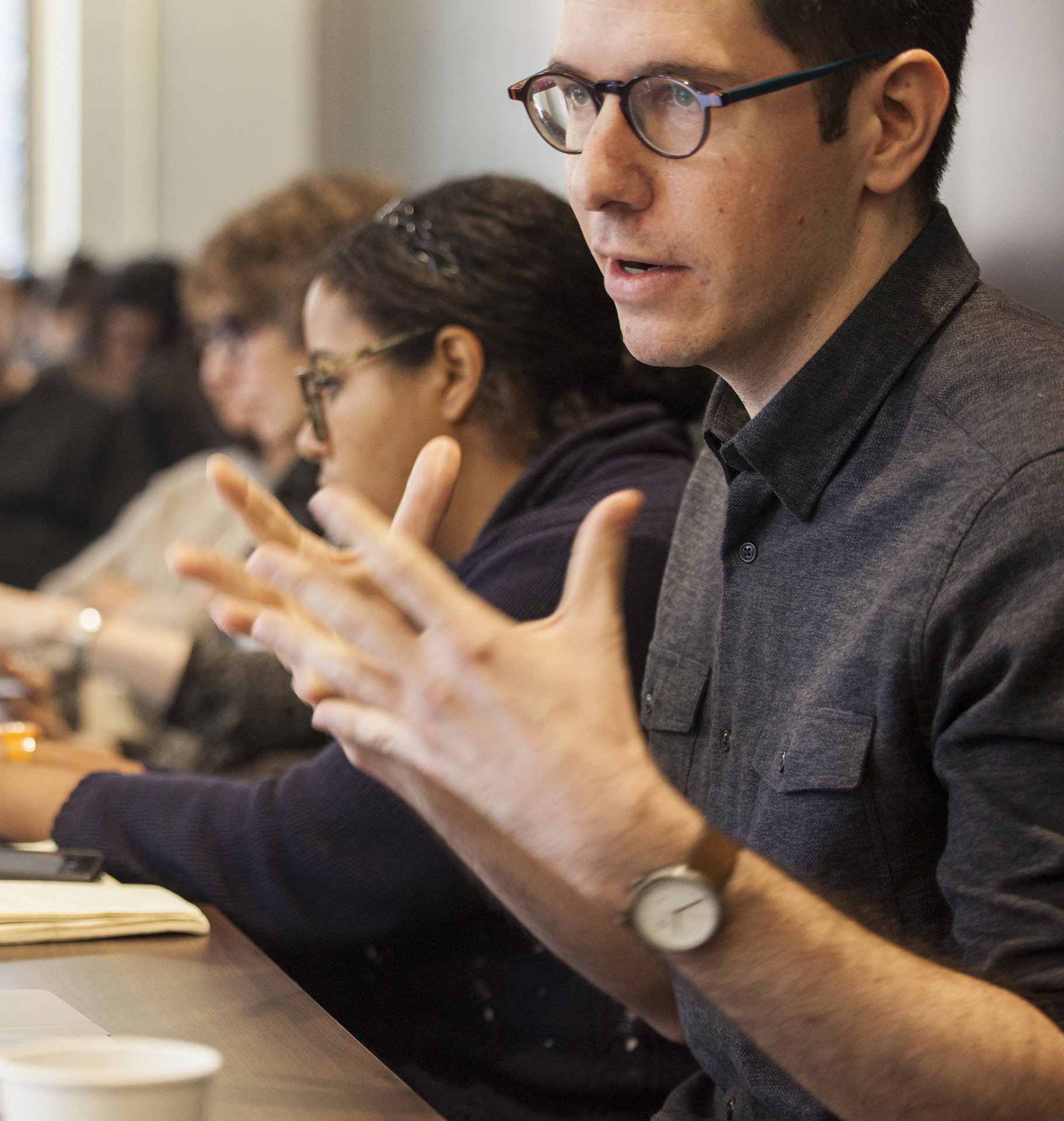David Carroll Simon

Associate Professor of English and Comparative Literature, English
Affiliate Faculty, The Harriet Tubman Department of Women, Gender, and Sexuality Studies
3241 Tawes Hall
Get Directions
Research Expertise
Comparative Literature
Early Modern Studies
LGBTQ Studies
Literary Theory
Literature and Science
Poetics
Women's Literature and Feminist Theory
David Carroll Simon works in the field of comparative literature, with a focus on the early modern period. In addition to questions of literary form and genre, he is interested in the history of science and philosophy; the history of the passions, including the history of sexuality; feminism, including early modern traditions; and social and economic history.
Simon is the author of Light without Heat: The Observational Mood from Bacon to Milton (Cornell University Press, 2018), which argues for the importance of careless inattention and open-ended receptivity to the literary and philosophical experiments of England's scientific revolution. He is now at work on a study of comedy, gender subordination, sexuality, and attention management.
Recently, Simon has taught courses on Shakespeare, Milton, methods in the discipline of English, the literature and philosophy of the seventeenth and eighteenth centuries, science and fiction, ethico-political dimensions of comedy, and recent developments in feminist theory and LGBTQ Studies.
Publications
"Knowingness and Eros: Andrew Marvell’s 'Last Instructions to a Painter'"
Featured in Imagining Andrew Marvell at 400
Author/Lead: David Carroll SimonEds. Matthew C. Augustine, Giulio J. Pertile, and Steven N. Zwicker (Oxford University Press, 2022).
This essay argues that Andrew Marvell's Last Instructions to a Painter should be read as a critique and an evasion of knowingness--of the feeling of contented possession that stands in for knowledge and so renders thinking superfluous. The poem suggests that sexuality is a domain of human experience from which ideologies of self-evidence draw affective strength. Marvell holds up for comparison two ignominious experiences of knowing incuriosity: the conventionalized version of sexual pleasure in which desire is simply and conclusively gratified and the form of pseudo-understanding in which you seem to discover what in fact you presuppose. On the basis of Marvell's diagnosis and rejection of a culture of incuriosity, he casts a suspicious gaze on his own practice of political satire, which depends on thoughtless sexualization. Finally, Marvell seeks an escape from the realm of self-evidence in an experience of hyperbolic naïveté in which everything everyone assumes--about, in the first place, sexuality, but also about everything else--melts into air.
Editors: Julia Lupton and Donovan Sherman.
Cambridge University Press, forthcoming fall 2022.
This essay identifies and anatomizes a cruel rite of friendship. In 1 Henry IV, Hal bullies Falstaff by inducing him to fail. Yet the play frames Hal’s comic brutality as an expression of fondness. Because Hal understands Falstaff’s failures as occasions for self-display, he also sees them as opportunities to savor what is distinctive about his friend’s personality. Hal also interprets Falstaff’s ineptitude as evidence of stuckness and thus of the durability of his character. For his part, Falstaff’s readiness to perform shamelessness seems to lower the stakes of his ongoing humiliation; he is habituated to helplessness. The essay concludes by considering some of the reasons for which Shakespeare might have chosen to narrate the development of trust against the contrastive background of ethical obligation. In a speculative mode, I suggest that any ethical program that does not prioritize the leveling of hierarchy over the inculcation of virtue—any ethical program that is not also (and, indeed, primarily) a politics—will inevitably remain bound up with social subordination. As long as virtue is not the object of collective negotiation but rather an imposition from on high, it will encourage confused and abusive responses such as Hal’s bid for solidarity in wildness. It is telling that Shakespeare locates the resistance to virtue even in the very person who benefits most from the values it reproduces.
"Lyric Misogyny and the Comedy of Interpretation: Rereading ‘To His Coy Mistress'"
Featured in Representations
Author/Lead: David Carroll SimonForthcoming: Fall, 2022.
This essay aims to understand the relationship between feeling and attention in gendered experiences of evaluative perception. Juxtaposing Andrew Marvell’s “To His Coy Mistress” with ancient and early modern descriptions of laughter, humor, and comedy, I develop a new reading of this poem in which unserious or gratuitous attention is identified with gender subordination. Marvell’s poem confuses the hierarchy of significance on which comic misogyny depends. I conclude by identifying some of the cultural-historical reasons that the scene of heteroerotic encounter makes sense as a point of departure for Marvell’s experiment in levity.
“Vicious Pranks: Comedy and Cruelty in Rabelais and Shakespeare”
This essay juxtaposes vicious pranks in François Rabelais’s Pantagruel (1532) and William Shakespeare’s Twelfth Night (1601) in order to describe a form of comic violence that functions as a knowledge claim about its target.
Author/Lead: David Carroll SimonRead More about “Vicious Pranks: Comedy and Cruelty in Rabelais and Shakespeare”
“Milton’s Panorama: Paradise Regained in the Age of Critique”
This essay begins with a discussion of recent debates about the value of “critique” and other forms of adversarial reading, arguing that influential proposals for “post-critical” alternatives have privileged the role of fixed psychic states in the practic
Author/Lead: David Carroll SimonRead More about “Milton’s Panorama: Paradise Regained in the Age of Critique”
Light without Heat: The Observational Mood from Bacon to Milton
In Light without Heat, David Carroll Simon argues for the importance of carelessness to the literary and scientific experiments of the seventeenth century.
Author/Lead: David Carroll SimonRead More about Light without Heat: The Observational Mood from Bacon to Milton
“The Anatomy of Schadenfreude; or, Montaigne’s Laughter"
Philosophers have often condemned schadenfreude, the pleasure someone takes in someone else’s suffering, as proof of moral failure
Author/Lead: David Carroll SimonRead More about “The Anatomy of Schadenfreude; or, Montaigne’s Laughter"

